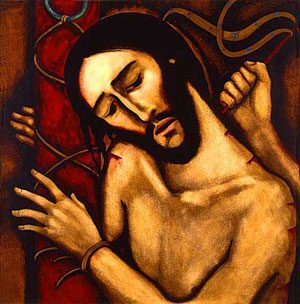The Obedient Son In
his death on the cross, Christ gave the fullest example of love,
By Steve Clark The humility
of the Son of the King
Though he was in the form of God, [he] did not countThe hymn begins by considering Christ. “Form” here does not mean external shape, but something more like “the very nature of God,” as translated in the New International version (NIV). The hymn begins, then, with Christ as the divine Son, in “the glory which [he] had with [his Father] before the world was made” (John 17:5). We are perhaps to think of Christ together with his Father, “who sits above the circle of the earth, and its inhabitants are like grasshoppers” (Isaiah 40.22). As insignificant as human beings are in comparison, he had compassion on them in their predicament. Perhaps they looked to him like ants might look to us after their anthill had been run over by a lawn mower: in confusion and turmoil, their home damaged by something they could not even comprehend. Then this divine Son – the image of God after whom the first human being was created (2 Corinthians 4:4; Colossians 3:l0) – did the very opposite of Adam. Rather than reaching out to become “like God,” Christ did not even hold on to the glory and greatness he already shared with his Father. Instead he emptied himself, put aside his position, and took a lower place, the place of a servant or slave. “For us men and for our salvation, he came down from heaven and became man” (Nicene Creed). The Son of God came down from heaven to earth, both in the sense in which the incarnation is a descent and in the sense in which a great king might take the maid’s place if she were too sick to serve the meal. He put aside his royal robes and put on an apron, so to speak. “For you know the generosity [RSV: grace] of our Lord Jesus Christ, that though he was rich, yet for your sake he became poor, so that by his poverty you might become rich” (2 Corinthians 8:9). The humility of the Son of the King of the universe did not stop there. Perhaps we would be impressed by a prince who strolled the streets and chatted with the villagers, stopping to inquire after the health of the street cleaner. Christ did not come to be served; he did not even come to visit. Rather, he voluntarily came to serve (Mark 10:45). Although himself the commander of the armies of heaven, Christ came to take orders. But he did not even come to take the orders given to soldiers sent out on a difficult and certainly fatal mission. That would be a glorious service. Rather, he came to die like a criminal – in fact, like the worst of criminals in the most degrading and painful death of all: crucifixion. He came to
serve his own servants
Paul introduces the above hymn with the exhortation, “Have this mind among yourselves, which you have in Christ Jesus” (Philippians 2:5). Paul thereby is holding up Christ as an example of someone who loved his Father, counting his Father as higher than himself and obeying him faithfully. He also is holding Christ up as an example of someone who loved his brothers and sisters, being among them as one who served (Luke 22:27). In short, Christ fulfilled the commandments summed up, in, as he himself taught, love of God and love of neighbor (Matthew 22:37-40). And in his death on the cross, he gave the fullest example of love, both of God and of neighbor. Paul had a practical goal in quoting this hymn to Christ. He was exhorting the Christian community at Philippi to remain united in the midst of persecution. Christ is presented as the model of one who brings about unity. By his obedience, Christ maintained unity with the one higher than himself, his Father. He established unity with others by looking to their interests and serving them. For those who accepted him, Christ's obedience and service was reconciling, peace-producing, as love is. His aim, in fact, was “to unite all things” (Ephesians 1:l0) by what he did. The requirements for a death that would restore the human race were high. Not any kind of death would do. It had to be the death of a special person. The one who died to redeem us had to be the New Adam, the great High Priest, and the Son of God. He had to have a special kind of relationship to God, and to us, to offer an effective redemptive sacrifice. The death of
the Redeemer had to be an act of love
Maximus Confessor expresses this truth in The Ascetic Life: Our Lord Jesus Christ, being God by nature and, because of His kindness, deigning also to become man, was born of a woman and made under the law, as the divine Apostle says, that by observing the commandment as man He might overturn the ancient curse on Adam. Now the Lord knew that the whole law and the prophets depend on the two commandments of the law – Thou shalt love the Lord thy God with thy whole heart, and thy neighbor as thyself. He therefore was eager to observe them the way a human would, from beginning to end.Since Christ came for our sakes, it is much easier to see how his death was and had to be an act of love of us. His death also was an act of love of God and therefore an act of obedience. Only as an act of obedience could Christ’s death be a payment, a substitution, and a sacrifice that could accomplish our redemption.
|
. | |||
|
publishing address: Park Royal Business Centre, 9-17 Park Royal Road, Suite 108, London NW10 7LQ, United Kingdom email: living.bulwark@yahoo.com |
. |

